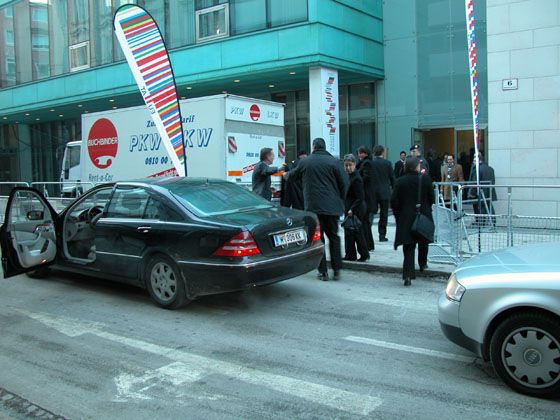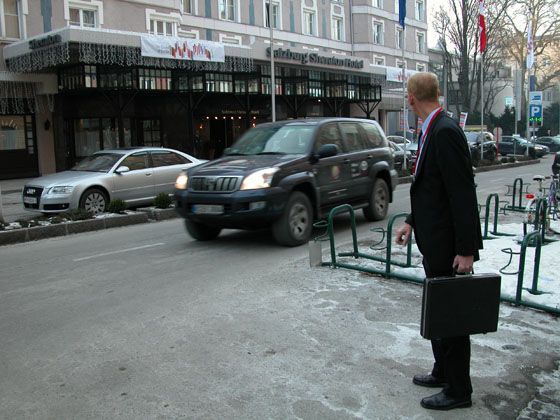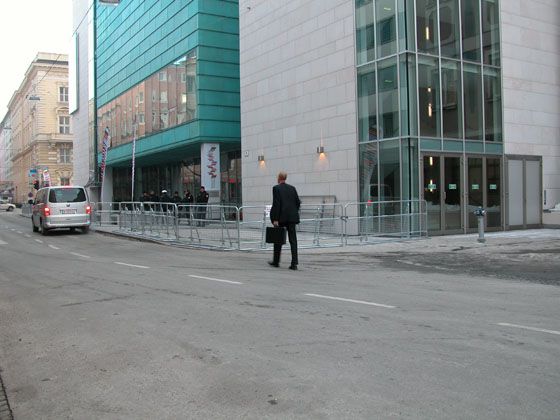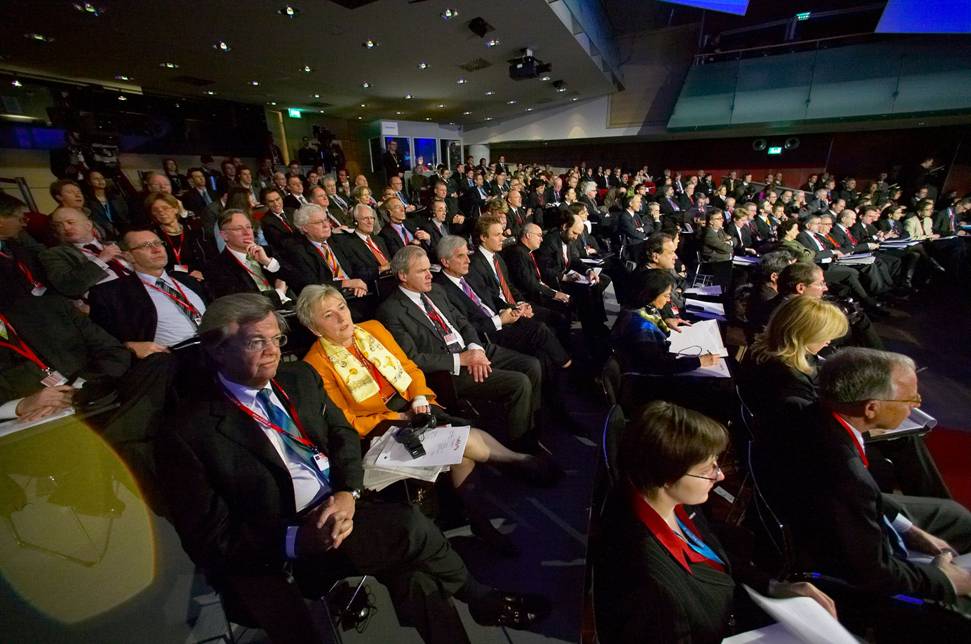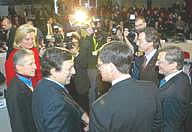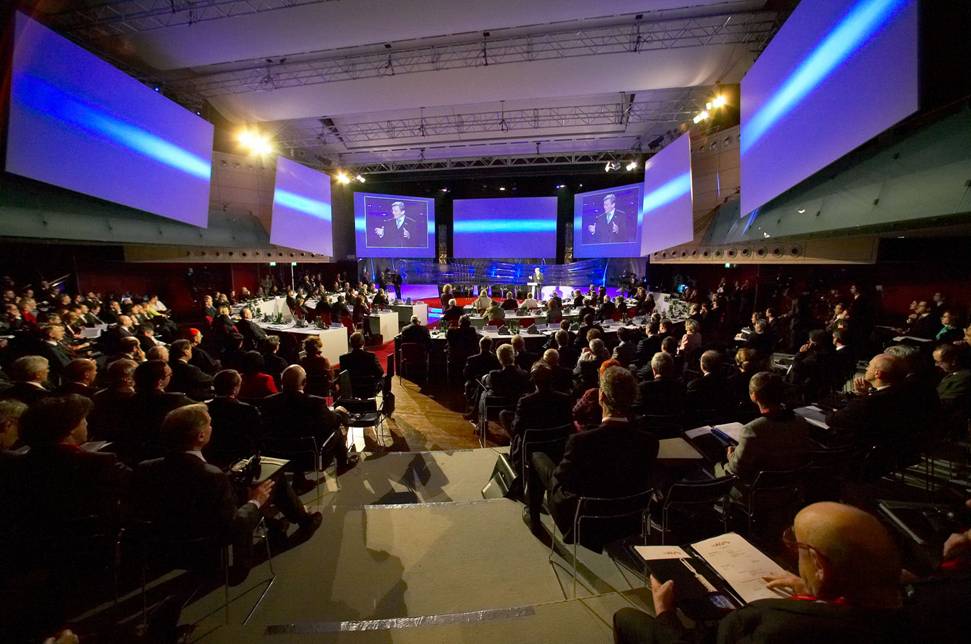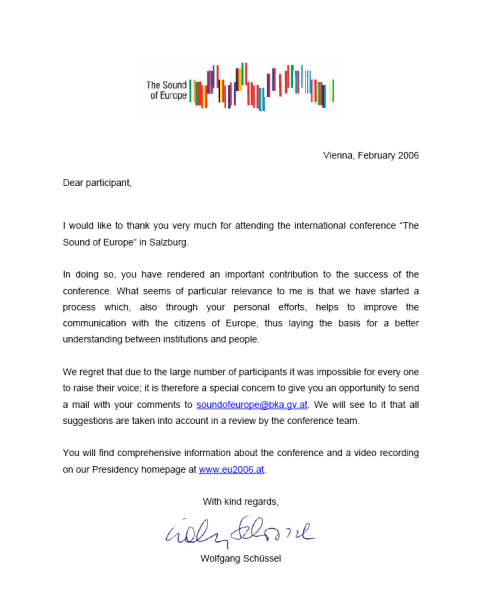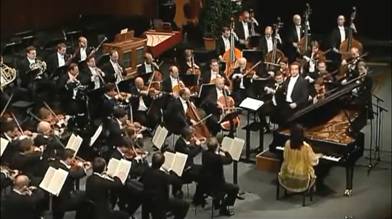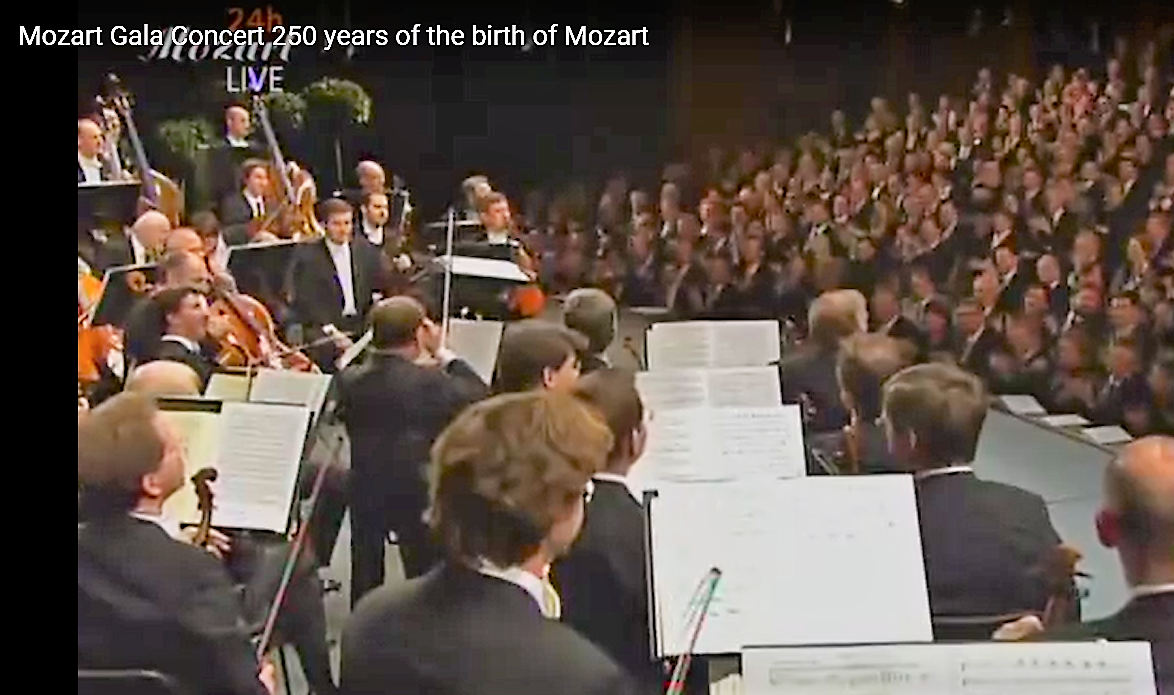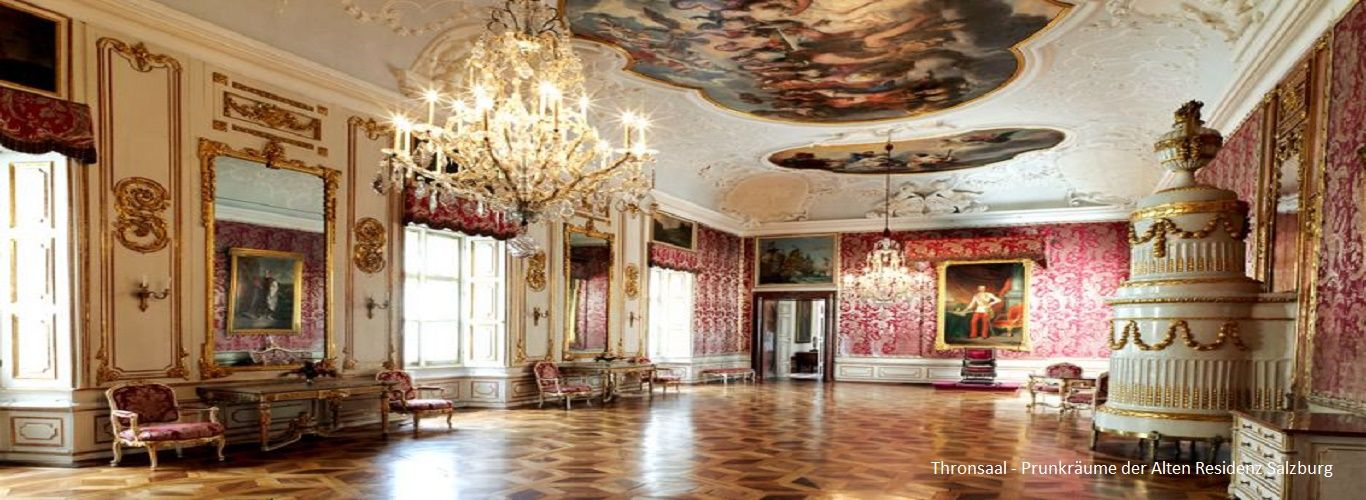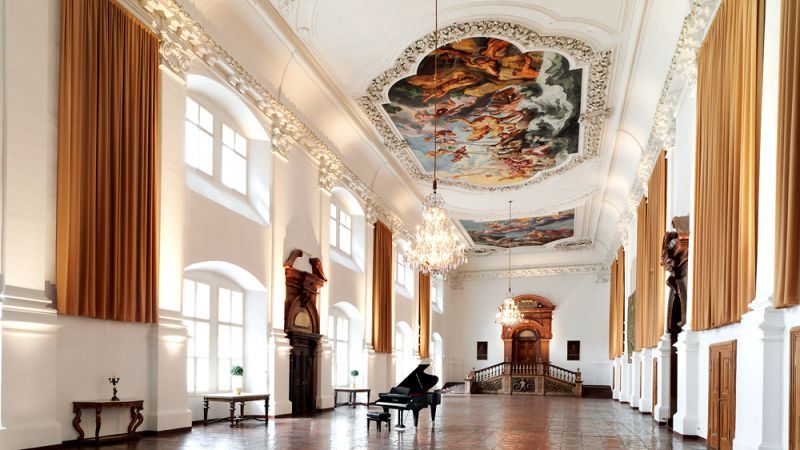27.01.2006: Keynote speech by the French Prime Minister Dominique de Villepin at the conference "The Sound of Europe" in Salzburg.
The President of the Republic of Austria,
The Federal Chancellor, Dear Wolfgang,
Madam President (Latvia),
The Prime Ministers of the Netherlands, Croatia and the Czech Republic,
The President of the European Commission,
The President of the European Parliament,
Honourable Ministers,
Ladies and Gentlemen,lt is a great honour for me to be here with you today for this debate that marks the start of the Austrian presidency of the Union. lt is with great emotion that I take the floor in this city of Salzburg, which for every European is synonymous with Mozart. Everywhere in Europe, in Prague, in Vienna, there are houses where Mozart lived, but Salzburg, alone, is where Mozart is: this is where he lived and breathed; this is the simple, natural framework of his childhood, his genius and his vitality.So let us not deny ourselves the pleasure of being in this city, let us not deny ourselves the pleasure of talking about Europe, since, despite difficulties and doubts, we have reasons for hope:
-
The fact that Europe continues to celebrate and love its great artists, that it listens to them and draws inspiration from them is a sign that our creative potential is intact.
That Austria is taking over the presidency of our Union is also good news. Austria is part of our overall history — lt is a country that is very close, very similar to France. You are the heirs of those many nations that came together to increase their strength, that were able to blend their languages, cultures and traditions in a spirit of tolerance, that challenged even those certainties most deeply rooted in our minds, that experienced empires and the dismantling of empires, power and equilibrium, and that know how to look at their past with a lucid mind.
-
So, Mr Chancellor, I would like to express my confidence and my hope: I know that over the next six months Europe will be in good hands for the task of recovering its self-confidence.
1. Yes, Europe is going through a period of crisisThe rejection by two founding members of the Union of the treaty to establish a constitution has struck a blow at the project of European integration. But I would like to be very clear about this. France did not say no to Europe - rather, it expressed its fears, anxieties and aspirations.For a long time, Europe was a utopia, one of those dreams in which we believe even more because we have forgotten their fragility and their meaning. Today, lt is an arena for questioning. Let us be realistic: we are confronted with a deep-seated crisis:
Our fellow citizens are asking whether Europe is still capable of making operational decisions, rapidly, to meet their expectations. The complexity of our institutions, the ponderousness of our regulatory mechanisms and the length of time it takes to achieve consensus are today seen as obstacles to European political action. For instance, for several weeks now we have been discussing extension of the 5.5% rate of VAT for the building sector. Many people have difficulty understanding why we are not making faster progress on a question that concerns tens of thousands of jobs in 9 countries of the European Union.This risk of paralysis is even more worrying in that the world is changing very fast and we are facing increasingly stiff international economic competition. At a time when new economic powerhouses such as India or China provide further proof of their vitality every day, Europe cannot remain immobile. It must take advantage of globalisation, win new market share, innovate and create leading-edge products to stimulate its own growth and create new jobs.This crisis of European decision-making goes well beyond a simple problem of operation - it is also an appeal for more democracy in Europe. Who makes the decisions today in Europe? In whose name? How are the choices that will durably affect the future of our societies made? How do we assess the results? Who accepts responsibility when a given measure proves to be ineffective? When do we decide to go back on a decision? Democratic transparency is a national imperative that governs the legitimacy of every one of our decisions. lt is also an imperative for Europe, since political Iegitimacy today is less the product of debate and declaration than of decision and results.
First, they are unclear about its geographical contours: no political entity can be built on a movement of rapid and continuous expansion whose limits are uncertain. No political project can live without a border. A border does not define solely a space and sovereignty but also marks an attachment to values, defence of a culture, reference to a memory. Europe has recently experienced an unprecedented enlargement: by integrating ten new countries, it has passed a major milestone in its development. My conviction is that we may not have sufficiently anticipated the consequences of these major political choices. We embarked on the path of enlargement without fully measuring the need to go deeper, to consolidate our rules and bolster our demands.Obviously, we do not question the legitimacy of this Integration of new member countries. We need only look back to our history and the separation inflicted on Europe by the Cold War to know that these countries have their rightful place amongst us. They are not an extension of the European identity - they are the European identity. This reunion with the "kidnapped continent of which Milan Kundera so often spoke, is the very expression of the values of freedom and democracy which Europe has always defended against totalitarianism. And here I would like to pay tribute to the very special role played by Austria in the dialogue with the new member states: during the Cold War period, you succeeded, thanks to both Bruno Kreisky and Alois Möck, in maintaining dialogue and close links with the countries under the influence of the Soviet block. A few years later, the membership negotiations with the ten new member states started under the Austrian presidency.But we must recognise today that we did not adequately prepare the ground for this enlargement, neither on the economic nor the political plane. At a time when our own companies and employees are facing serious difficulties, the arrival of new members has often been perceived as too great a financial burden. This gap between the goal of Europe und the Union's real capacities has created feelings of unease and even genuine distress among our own peoples.The identity crisis we are experiencing also arises from the ambiguity of the European political model:
-
What do we want to become? A federal Union along the lines of the United States? A confederation of nation¬-states? Or do we wish to become simply an economic space defined by the absence of borders and customs barriers? These questions are in all our minds, but we have never spoken plainly about them together. It is time to resume the debate and to set a course.
-
Europe has been built in reverse: it is defined more by movement than limits, by progression rather than goals. The political origins of Europe can be found in the declaration made by Robert Schuman in the Salon de l'Horloge at the Quai d'Orsay, when he announced the creation of the European CoaI and Steel Community between France and Germany. Take the Treaty of Rome which, in 1957, founded the 6-member European Community: the very foreword to the treaty recognized the embryonic nature of this union, since it declared that the signatories were "determined to establish the foundations for ever closer union between the peoples of Europe." The project to draft a constitution for Europe under the aegis of Valéry Giscard d'Estaing aimed at remedying this lack of a solid foundation. We are obliged to admit today that this important step was not understood by everyone.
Finally, and this is perhaps the key to this identity crisis, Europe seems to have difficulty defending its values.
-
In a world that is tending increasingly towards uniformity, European citizens have the impression that Europe is gradually losing ground and that it risks losing its specific identity in the movement of globalisation.
And yet, over and above the differences arising out of the history of each nation, we Europeans share the same desire for solidarity, social cohesion and equilibrium between justice and economic dynamism. In Austria, France, the United Kingdom and Denmark, we share the same conviction that the state has a special responsibility: to protect employees, to guarantee a certain number of services such as health or education, to ensure equal opportunity and to come to the assistance of the most disadvantaged.
-
Today, Europeans feel that we are not adequately defending these aspirations and that Europe may become simply a mechanism for advancing globalisation. Let us be clear: if Europe becomes merely an economic project, if the member states see membership solely as a way of obtaining certain economic benefits, then our Europe has no future. Our values are what give us our identity and our strength, what makes our voice both singular and powerful. And that is why I would like to salute the initiative of Chancellor Schüssel, who has decided to place die Austrian presidency of the Union under the aegis of our common values.
2. Faced with this situation. I would like to express my conviction: Europe has always been able to make every crisis the springboard for a new leap forward.Yes, there truly is European adventure.This adventure is that of a specific human being, with his/her aspirations and doubts, successes and trials: the European. For, leaving aside the diversity of our peoples, I am convinced that there are a number of characteristics that define this universal human being and which we all share:A European is first and foremost a person who is open to others.
-
This is the distinctive imprint of our geography and our history: no other continent has succeeded as well as Europe in welcoming cultures, adopting new techniques, accepting discoveries made elsewhere and integrating them into our own tradition.
Openness is also the capacity to step outside one's self and reach out to others: Europeans have never abandoned their thirst for discovery nor their curiosity about the world outside their continent. From the crusades to the Conquistadors and the empires, for many centuries this search bore the hallmarks of conquest and the will to dominate. Today, it is inspired by ideals of respect and exchange.
-
For being European means recognizing that we come from elsewhere, that our heritage is many¬stranded and that we need others in order to understand ourselves. The outside world has helped us grow and we are strengthened by our discoveries und our aspirations.
The European is also someone who has understood the limits of power and the spirit of conquest.
-
We have a profound sense of history, marked by the wounds that our rivalries and conflicts have inflicted on us. The territory of Europe bears the marks of the borders over which we have fought, the trenches we have dug und the walls we have erected. How many times has Europe promised itself "never again"? How many, times has it proclaimed peace only to be caught up in the dreadful spiral of war and barbarity?
Adorno asked whether lt was possible to write poetry after Auschwitz. He could just as well have asked whether the spirit of Europe still had any meaning after Auschwitz, Sobibor und Treblinka.We Europeans have been experienced the most dreadful ordeals, we have lived years that deserve to be erased, we have committed irreparable crimes, things that our imagination refuses even to conceive today.
And yet, after doubting their own humanity, Europeans were able to liberate themselves from the fatality of history. By building their future on the French-German relationship, they chose the path of reconciliation. They built their future on a dual identity: the nation and the political ideal still to be defined - Europe. As Musil said: "Each of us has a second country where everything we do is innocent". For each of use, Europe is indeed this second country.
-
Austria is perhaps the best example of this European spirit.
What your country underwent at the turn of the last century foreshadows the major issues with which Europe is now confronted:The issue of nation und motherland, to begin with, in a country that bears the memory, of the Austro-Hungarian empire: this polyglot empire that prefigured Mitteleuropa looked for the first time at the problem of identity. Where was the empire's centre? Was it, as Hermann Broch said, the empty box set aside for the emperor in every theatre in every town of the empire? Was it the Cacanie of The Man without Qualities, the impossible reconciliation of the quest for unity, and the loss of meaning? These are the same questions we are asking ourselves today about our common future.The end of the Austro-Hungarian empire also brings us back to questions about power: its legitimacy and its real capacity to change the world. This questioning has continued to inspire your great writers, from Thomas Bernhard to Elfriede Jelinek.Austria has also played an important role in European culture:When Klimt resigned from the association of Viennese artists in 1897, he set the course of European modern art for many years: a course of secession, transgression and constant challenging of our certainties.Whether in architecture, painting or music, we owe to Vienna the concept of the avant-garde, which belonged only to Europe throughout the 2Oth century and was summed up by Elias Canetti: "lt is a trait inherent to the insatiable hunger but also the vehemence of youth, that one phenomenon or adventure inevitably supersedes another".In this way, Austria reminds us that the European is defined by his capacity to renounce his certainties, to experiment, to explore new paths. Is it a coincidence that in this Vienna of the turn of the last century, one man, Freud, dared to go further than all the others in exploring the unconscious and dreams?Finally, Austria offers us a certain image of European sociability.
-
Since Erasmus, the European has built his character on the books he reads, his travels and his encounters. And since we will now be celebrating the memory of Mozart, how could we forget his many journeys throughout Europe? As a child, he played the harpsichord for Mme de Pompadour; later he composed music for the greatest German princes und saw Don Giovanni staged for the first time in Prague.
The European feels at home everywhere in Europe, or, to repeat a remark made by Georges Steiner, he or she feels at home everywhere there are cafés, like the Schwarzenberg, the Central or the Hawelka in Vienna. Why cafés? Because they are cosmopolitan places where you can read newspapers from all over the world; because they are places for meeting and exchanging views that ignore the divide between social classes or generations. But most of all because cafés are places of culture where, from Stefan Zweig to Karl Kraus, people take the time to think and meditate.
-
Europe's strength is its capacity to overcome crises.
Because European thought has always been forged in doubt and questioning. Europe's strength is that it is never satisfied with what is, that it is always ready to challenge a fundamental truth to find another, even more solid.Jorge Semprun has often told me of the importance he attaches to a lecture by Husserl entitled "Philosophy, or the Crisis of European Humanity¶ Husserl gave this lecture in Vienna, in 1935, when he had already been disbarred by the German universities and Europe was suffering the assaults of totalitarian movements. In his lecture he said that "the crisis of European existence can end in only one of two ways: in the ruin of a Europe alienated from its rational sense of life, fallen into a barbarian hatred of spirit, or in the rebirth of Europe from the spirit of philosophy, through a heroism of reason." Europe's wisdom is that it has made every crisis an invitation to a new beginning.The history of our continent is strewn with difficulties, trials and rivalries, all of which were obstacles on the path of European peace.
-
This is true, in particular, of the relations between our two countries, both pretenders to European hegemony. We have always known how to emerge from the cycle of conflict and war, whether through the overthrow of alliances orchestrated by the Duc de Choiseul and the Count of Kaunitz, or the continental equilibrium organized in Vienna in 1815, whose dominant architects were Metternich and Talleyrand.
-
lt is also true since the start of the European project: we recovered from the failure of the planned European defence community by signing the Treaty of Rome; we made the entry of the United Kingdom a trump card for European defence; we succeeded in expanding membership to the Southern European countries and offering them genuine economic opportunities.
The originality of the European project of integration also explains its difficulty: we do not have a known model to guide us. We invent as we go along. We have taken the risk of inventing a new political entity, one that no other country has ever tried. We have chosen to reconcile our memories while preserving the specific identity, of each of our nations. We have accepted to be always poised between the known und the unknown, between desire und discovery. Our strength is that we have always been able to advance on two feet: pragmatism and the spirit of responsibility. Today, it is these two virtues that must guide us to overcome the present crisis:Pragmatism, first of all: we are dealing with a movement that affects the whole planet: the new affirmation of nations. They are the authority to which citizens apply to be better protected, better heard, better defended. lt is through nations that peoples express their identity and their aspirations. Europe must therefore take note of this movement und preserve the place of nations, while avoiding the pitfalls of nationalism and isolation. This is the challenge: to make the nation a place of identity and openness, a benchmark but also a point of departure for understanding others and the world. Europe's progress cannot be based on the erosion of nations, but on acknowledgement of their virtues and pooling of their strengths.Secondly, the spirit of responsibility: Europe has a unique message to deliver, one that is awaited throughout the world. lt has never ceased to take strong positions on preservation of the environment with the aim of furthering the main objectives of the international community. The Kyoto protocol is the best example of this. In the fight for international justice and the defence of fundamental freedoms, Europe is an essential player. In the cultural field, we have succeeded in encouraging UNESCO to adopt the charter on cultural diversity. We have a responsibility to other regions of the world.3. Today, once again, Europe must find in itself the means to overcome the crisis and pursue its destiny.My conviction is that we have to write a new chapter in the history of Europe: that of its peoples.Europe has recently sustained two major setbacks:
-
First of all, the Iraqi crisis, in which our countries were unable to overcome their divisions, even though the peoples of Europe were unanimous in their demand that international law be respected.
-
Islamic terrorism, which struck at the heart of Madrid and London, revealing the vulnerability of our societies to new threats.
These trials must today encourage us to open up a new path for our peoples, a new period in European history. Let us not forget that when our governments and states debate such questions as reduced-rate VAT or the services directive, what lies behind these questions is the whole challenge of a common consciousness that is emerging and that is essential to the vitality of the European project. Let us learn how to respond to the aspirations of our fellow citizens, let us learn how to anticipate their questions and calm their anxieties. This is essential if we wish to prevent national egotisms sweeping away the European dream.And it is why the big challenge for Europe today, the project that demands both humility and perseverance, is that of projects; this is what demonstrates that Europe is moving ahead, that it has meaning, that it is the future for everyone of us. This Europe of projects is not a Europe on the cheap: lt is a Europe that bears witness, a Europe that exists and lives in concrete terms, day after day. In every field, we must show that it is capable of defending the interests of our fellow citizens and satisfying their aspirations:In the field of security, we must be capable of proving to our fellow citizens that Europe can protect them against the great scourges of trafficking, organised crime and terrorism. To do this, we can rely on the progress that has already been achieved with various partners, whether in terms of border controls, exchanging lists of terrorists or the efforts we are making to control unauthorized immigration. These initiatives could be taken further if we start working, as of today, on setting up a European border police force. They might also be expanded to include other member states.In the field of research and universities, the European countries must at all costs combine their efforts in order to compete at the highest international level. We must also find new resources for innovation, for instance, by setting up as quickly as possible the research facility of the European Investment Bank as decided in December. Let us unite around major projects such as the European digital library. We must also increase the number of exchanges between our students and facilitate their mobility, so that Europe becomes a genuine space of knowledge and excellence.In the cultural field, we could also unite our strengths to enhance the value of Europe's heritage. Here, in Salzburg, how can we not understand that preservation of our sites and monuments is an essential priority for our countries? Why should we not set up, on the UNESCO model, a top-Ievel scientific committee that would be responsible for awarding a European heritage label? This would constitute a strong recognition of the place that culture occupies in the European project. lt would also be a way of enhancing the attractiveness of our countries and stimulating tourism.In the field of health, we must combine our capacities to face up to new risks, such as avian flu. lf we want quicker response and better coordination of our systems of prevention, warning and crisis, we must set up a genuine specialised rapid response force. France and Germany are keen to create a first reserve of experts, and we welcome any other country that would like to join with us.In the field of energy, we must pick up the challenge of the post-oil era. Energy independence for Europe is particularly vital in that we are confronted with regional tensions, whether disagreements between Russia and Ukraine or the Iranian situation. In accordance with the commitment made by President Jacques Chirac at Hampton Court, France presented a memorandum on energy to the Ecofin Council on 24 January. We would like to use this memorandum as a basis to move forward, with our partners, towards a genuine European energy policy.Finally, Europe must make concrete progress in the economic field. We have a common currency, which is a formidable advantage for our companies, and yet European growth is not sufficient. We must work together better to defend Europe's economic interests. We must also work together to define strategic projects that will allow us to boost growth and create jobs.We also need more democratic institutions, to reconcile our citizens with the European project. I know that the Austrian presidency is carefully preparing the European Council meeting scheduled for June, which will be Iooking at the future of Europe and, in particular, its institutions. The criterion of efficacy is, of course, paramount, in a Europe that is now moving forward with 25 members. But we must also think about proposals to reinforce the legitimacy of these institutions. I have taken a certain number of measures to more closely involve the French parliament with decisions made by the Union. The national parliaments are the representatives of our different peoples and their role must go beyond simple transposition of European texts.To regain the trust of its peoples, Europe will have to speak truthfully, and answer the questions which European citizens are asking today:The first question is that of borders:
-
We must be clear about membership criteria, which must be based not only on the European history, and identity, of candidate countries and their respect of the Union's values and rules, but also the Union's capacity of absorption.
We must be clear too about forthcoming milestones: in the case of Bulgaria and Romania, they must become members as soon as possible on the basis of the next recommendations of the Commission. As for the Balkan countries, a region that is particularly, close to you both in terms of geography and history, we hope that they, too will join the Union on condition that they scrupulously respect the membership conditions. In the case of Turkey, the decision to open membership negotiations was made some weeks ago. This is a major political decision, the result of commitments made by Europe several decades ago, but also of the considerable efforts accomplished by Turkey. The process that has now started must be carefully monitored at every stage and must be conditional on compliance with the criteria set by the Union. lt is, finally, a process whose outcome must remain open until the end of the negotiations. In France, we decided that the last word must be given to the French people by way of referendum.
-
But we must also, as of now, define a global strategy for enlargement of the Union and its relations with the surrounding countries: membership must not be the only solution proposed to neighbouring countries. We must also be able to offer them ambitious partnerships, likely to help them on the path towards democracy and economic growth.
The second question to which we must reply is the question of Europe's ambitions. Do we want solely to become the richest continent in the world? Or do we also want to defend our values outside our borders?
-
My conviction is that Europe means nothing if it is unable to convey its message beyond its own borders. We must demonstrate the legitimacy and universality of our principles by defending them in the international arena.
We are the leading provider of development aid in the world. This is because we know that poverty and injustice are not only unacceptable from the moral point of view, but that, exploited by fanatics, they can create fertile ground for violence and terrorism.
Europe has proved that it is capable of military intervention in countries where freedom is endangered. We are present in Afghanistan, for instance, to support democracy und help with the rebuilding of the State.
-
We should also be active in respect of the major geopolitical issues, in a world that is constantly confronted with fresh crises. In Iran, we demonstrated that we are able to play a top-level role when we speak with a single voice. In the Middle East, we are the leading supplier of aid to the Palestinians: we therefore have a significant responsibility to seek a political settlement. This is particularly true today, with the recent accession to power of Hamas. This is a major challenge for us all: no progress can be made without clear and definitive renunciation of violence, without explicit recognition of the State of Israel and without strong support for the peace process initiated, in particular, by the Oslo agreements. lt is essential for us to speak clearly and promote justice in every part of the world and in every arena.
Ladies and Gentlemen, Incompletion is one of Europe's main characteristics. To come back to Salzburg and music, we all know that Schubert did not finish his 8th symphony, that Mozart died without writing the last notes of his requiem and that Bach closed his eyes to the last notes of an endless fugue. lncompletion is not a failure: it is an appeal to the next generations to continue with the work accomplished and to take it further. We are the new generations of Europe. lt is our responsibility to find the means for its political accomplishment, while remaining faithful to the ambitions and values of all those who went before us. The big rendezvous is not tomorrow, it is today, stimulated by our own conscience and the peoples of Europe
Thank you. |



